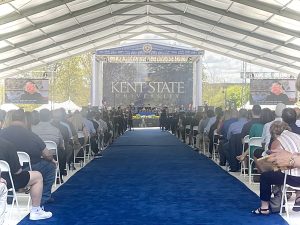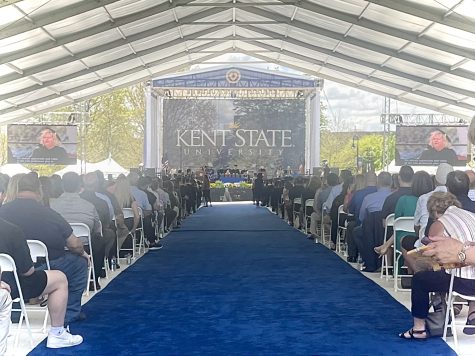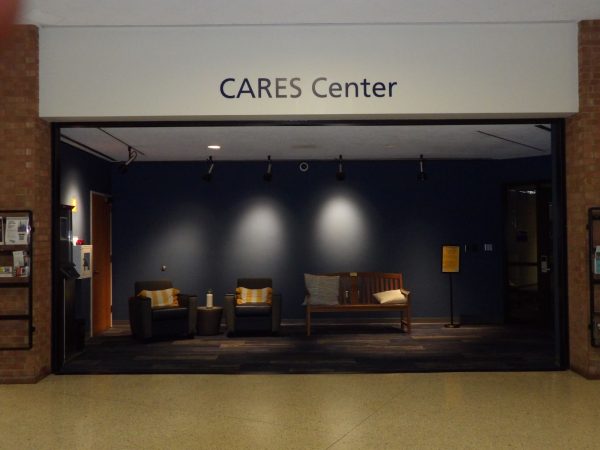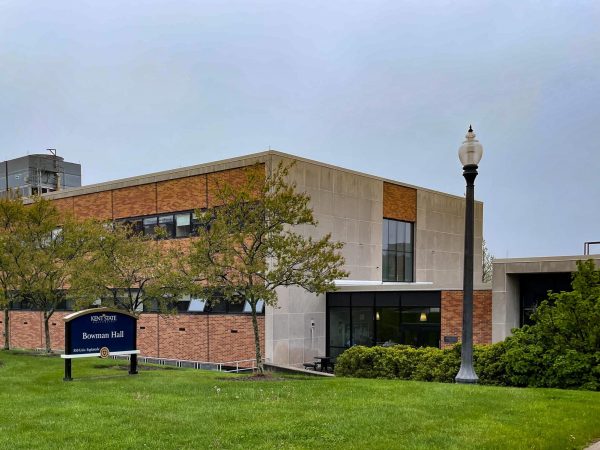Program encourages nursing to advance education
March 28, 2008
The College of Nursing hosted the program “Driving the Future II: Clinical Conversations About Tomorrow’s Nurse: Transforming Clinical Education Through Collaboration/Crafting New Competencies for Ohio Nurses” yesterday in the Kiva. The program, which was sponsored by the College of Nursing, the Cleveland Clinic Nursing Initiative and the Deans’ Roundtable Collaboration, featured distinguished speaker Dr. Christine Tanner.
The event began at 9 a.m. with a welcome and introductions by Dr. Laura Dzurec, dean of the College of Nursing, and President Lester Lefton. Dr. Tanner then presented on how the nursing shortage in Oregon, similar to Ohio’s, has been addressed. Tanner spoke about the institution of the Oregon Consortium for Nursing Education, with which she has been involved since 2001.
Tanner said the OCNE is encouraging a partnership of several community colleges and the Oregon Health and Science University to prepare students to become a “new kind” of nurse for the 21st century. The organization is also focused on utilizing educational and clinical resources as efficiently as possible.
Tanner said the consortium was established because of severe nursing shortages and incompetent programs. She said Oregon’s fiscal crisis presented challenges for the OCNE, such as shortages of qualified nursing faculty, clinical sites, classrooms and equipment.
The OCNE’s successful development of a new curriculum was vital to aiding Oregon’s nursing problems. Tanner said the revised competency-based education involves advances in nursing technology and focuses on patient-centered care. Tanner also talked about how the organization prepared faculty to provide more proficient instruction. Such preparations included post-master’s certification, intensive workshops and familiarization with new simulation technology.
Tanner also spoke about the challenges faced across the nation by those wishing to advance clinical education. She emphasized the importance of working together to change the current nursing crisis, citing an African proverb that says, “To go quickly, go alone. To go far, go together.”
After lunch in the Ballroom, the program moved to a roundtable discussion and opened for questions. The audience, which included not only students and faculty but also members of community hospitals, discussed what steps the Kent State nursing program should take to improve.
Several participants expressed the need for a more cohesive program. One student said that although she enjoyed and learned a lot at Kent State, the program felt “segmented and inefficient,” resulting in a “disconnected experience.” Another student agreed, saying that she loved the Kent State nursing program, but there is always room for improvement.
Throughout the program, Tanner stressed the importance of working together to improve nursing education, and she emphasized program cohesion in her final statement. Dean Dzurec closed the program at about 2 p.m., asking the audience what Kent State and the surrounding community will do to work toward improving the nursing program.
Tanner said she was impressed with the student participation and enthusiasm at Kent State, and said she was very glad to hear two groups making plans to begin working on program advancements. “I think we’ve had a resounding endorsement from students today,” Tanner said.
Dean Dzurec agreed that the nursing program will see advancements in the near future. Dzurec summarized the positive atmosphere of the program with an enthusiastic, “We can do it!”
Contact student health reporter Amanda Hayes at [email protected].























